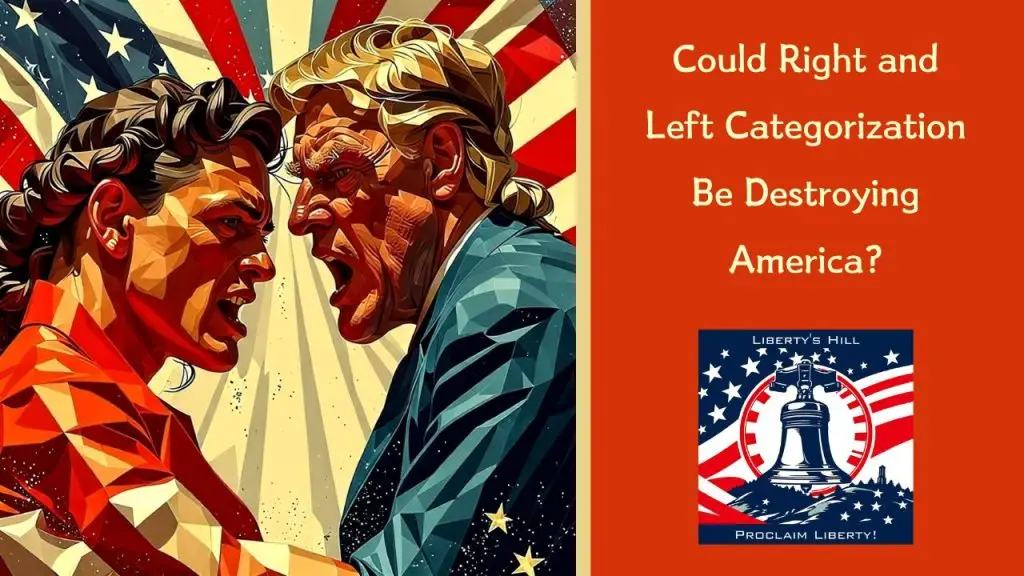Rethinking Political Categories: A Path to Human Flourishing
In a world increasingly divided by political ideologies, the categorization of individuals into right and left has become a source of contention. Dr. Bill Brannan, a pastor from Liberty Hill, Texas, explores whether this binary model is detrimental to America’s future. He argues that such divisions hinder our ability to foster a society rooted in liberty, justice, dignity, and prosperity.

Photo by Etienne Girardet on Unsplash
The Dangers of Labels
One of the most alarming trends in contemporary political discourse is the use of extreme labels like “Nazi” or “fascist.” Both sides of the political spectrum are guilty of this, using these terms to demonize those who think differently. This practice not only oversimplifies complex issues but also prevents meaningful dialogue.
Dr. Brannan points out that both the left and the right agree on the negative implications of tyranny. However, neither side effectively isolates the root problem, which keeps us from achieving the common goal of a just society. This failure to communicate leads to a cycle of misunderstanding and hostility, further entrenching divisions.

Photo by Norbert Braun on Unsplash
A Framework for Human Flourishing
To move beyond these divisions, Dr. Brannan suggests we need a framework of ideas that serves as a roadmap to liberty and prosperity. He emphasizes that no single idea will create the culture we aspire to, but together, various concepts can cultivate a world where everyone can thrive.
Before diving into specific ideas, Dr. Brannan addresses the notion that America is on the brink of destruction. This implies that there were foundational principles that were once good and should be preserved. He acknowledges that some believe America was never good, a topic for future discussion. For now, it is essential to highlight some of the positive ideas that have shaped the nation.

Photo by Debby Hudson on Unsplash
Exploring Foundational Ideas
Dr. Brannan draws on W. Cleon Skousen’s book, The 5000-Year Leap, to present foundational ideas that can lead to human flourishing. He expresses a commitment to exploring concepts that may come from various sources, including biblical ideas. While he acknowledges that the Bible has been misused in the past to justify oppression, he believes it can also offer valuable insights when approached ethically.
At the core of this exploration is the idea that good ideas lead to human flourishing, while bad ideas lead to inhumanity. Dr. Brannan emphasizes that he is less concerned about the origins of these ideas and more focused on their impact on society.

Photo by Ian Schneider on Unsplash
Servant Leadership vs. Tyrannical Leadership
One critical distinction Dr. Brannan makes is between tyrannical leadership and servant leadership. He references the teachings of Jesus, who described worldly leaders as those who “lord it over” others, leading to tyranny. In contrast, Jesus advocates for a model where greatness is defined by servitude.
This contrast is not just theological; it reflects real-world experiences. People flourish under servant leaders, while they suffer indignities under tyrannical rulers. This notion resonates with many who have experienced the difference between supportive and oppressive leadership in their workplaces.

Photo by Nick Fewings on Unsplash
Historical Context and Its Relevance
Dr. Brannan connects these leadership styles to historical events, particularly the Israelites’ experience in Egypt. He discusses how God delivered them from slavery and provided a social structure aimed at creating a world that stood in stark contrast to tyranny. A key element of this structure was the treatment of foreigners and strangers, emphasizing justice and dignity for all.
Under this framework, everyone is held to the same legal standards, including leaders. This accountability is crucial in combating the historical tendency for the powerful to exempt themselves from the law, which undermines the ideals of liberty and human flourishing.

Photo by Nathan Dumlao on Unsplash
Embracing Universal Ideas
Dr. Brannan stresses that the biblical ideas central to America’s founding were aimed at creating a society rooted in liberty and justice. He believes that the origins of these ideas matter less than their ability to foster a world that prioritizes human dignity over tyranny.
One of the challenges in this discussion is the question of America’s historical goodness. While acknowledging the nation’s failures, Dr. Brannan argues that a commitment to ideals can set a trajectory towards a better future. The belief that all people are created equal and endowed with rights can dismantle oppressive systems over time.

Photo by Gabe Pierce on Unsplash
Revisiting Political Ideologies
Dr. Brannan suggests that our current political framework, which categorizes individuals as liberal or conservative, has strayed from the ideological foundation set by the Founding Fathers. In Europe, communists are placed on the far left and fascists on the far right, but both represent forms of totalitarianism. In contrast, the Founders viewed liberty as standing against tyranny on one side and lawlessness on the other.
This perspective challenges us to rethink how we categorize political beliefs. Instead of viewing liberty in terms of right and left, we should see it as a position between tyranny and anarchy. This shift in thinking opens the door to more productive discussions about governance and society.

Photo by Element5 Digital on Unsplash
Engaging in Constructive Dialogue
Dr. Brannan invites readers to engage with these ideas and share their thoughts in the comments. He encourages a dialogue that seeks to explore the nuances of liberty, tyranny, and the values that can guide us toward a flourishing society.
As we navigate these complex issues, it’s crucial to remain open to diverse perspectives and to challenge the narratives that pit us against one another. By fostering an environment of understanding and respect, we can work together to build a future that prioritizes human dignity and justice.

Photo by Ricky Beron on Unsplash
Conclusion: A Call to Action
In summary, the categorization of people into right and left may be damaging to our collective progress. Dr. Brannan urges us to reconsider our political frameworks and focus on the ideas that can lead to human flourishing. By embracing servant leadership and holding ourselves accountable to the same standards, we can create a society that values justice, liberty, and dignity for all.
As we reflect on these ideas, let us commit to engaging in constructive conversations that transcend political divisions. Together, we can cultivate a world where everyone has the opportunity to thrive.


